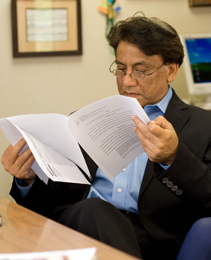Khan speaks on sabbatical to Middle East
September 23, 2007
For Washburn law professor Ali Khan, a recent trip to Saudi Arabia was more than just a sabbatical.
On Wednesday, Sept. 19, Khan discussed the details of his month-long visit at the Brown Bag International Lecture. Sponsored by the International Programs office, the series event is a show and tell of sorts, reserved for professors who have received faculty abroad assistance.
“Because the international program funded the airfare portion of my travel, I made plans to come back and lecture on my experience,” said Khan.
Through the assistance program, full-time faculty members on tenure track receive up to $1,200 to use toward international airfare. The funds are available only to support traveling abroad for scholarly and professional endeavors. Upon their return, faculty must share the activities of their travel with the campus community.
Prior to his departure, Khan wrote a letter of proposal to the Secretary General of Turkey, a fellow professor. In February he was formally invited to serve as a resident legal scholar at the Organization of Islamic Conference. A Muslim United Nations of sorts, the organization consists of 57 Muslim States.
“A third of the members’ states are from Africa, a third are from the Middle East and the other third includes Muslim states from many different parts of the world,” said Khan. “The main purpose is to promote peace and solve problems that are arising in the current Muslim world.”
Although he did some work in Pakistan, the country where he grew up and later received his law degree, most of Khan’s time was spent studying the ins and outs of the OIC. As the first professor to come and observe the group, Khan joked that it took some convincing to dissuade them from thinking he was a CIA spy.
“Initially this organization was primarily instituted to liberate Pakistan. Today, with plans to create free trade, the OIC is much more complex,” said Khan. “I truly feel that it will become a very influential organization in the foreseeable future.”
In Khan’s opinion Saudi Arabia has remained stable as a key country in the Middle East because of its overwhelming religious prevalence. It is currently known worldwide for its Islamic holy city, Mecca, the birthplace and burial site of the Prophet Muhammad.
“Islam originated there as well as the Quran,” said Khan. “I think that Saudi Arabia is truly a leader in the Muslim world.”
As a Muslim visiting the country for the first time, Khan made the journey to Mecca, which he called “indescribable.” He thought of his mother, who had passed away prior to his leaving for Saudi Arabia.
“It was a bit emotional when I came to Mecca and walked through the valleys surrounded by dark grey mountains,” said Khan. “I thought of the Prophet and wondered if I had walked over any of the same spots that he did once before.”
Mecca is strictly reserved for only Muslims. Those of other faiths are forbidden to enter the city and are kept out by roadblocks set up around the roads that lead inside.
While he was treated very well, Khan said that discrimination is still evident in Saudi Arabia. Women are not allowed to drive, although they’ve petitioned the king to relax the rule.
“Economic and class-based discrimination is more common than ethnic and racial prejudice,” said Khan. “The country is filled with Egyptian, Filipino and Indian immigrants who are all quite similar in appearance.”
The nation is also quite interested in the United States. Americans who come to Saudi Arabia seeking a job are usually given even better placement than some natives.
“They are very much impressed with America,” said Khan. “Even though there is tension with subjects such as our foreign policy matter and the War on Iraq, respect is indeed evident.”
Khan hoped that by sharing some of his experiences abroad, he could in turn encourage more college students to study abroad or just travel in general. The international/commercial law professor believes that students need to see different cultures and experience something new and out of their set comfort zone.
“It’s easy to go to Europe, it’s easy to travel to an English speaking country,” said Khan. “How about going somewhere with a different language and learning something valuable?”



